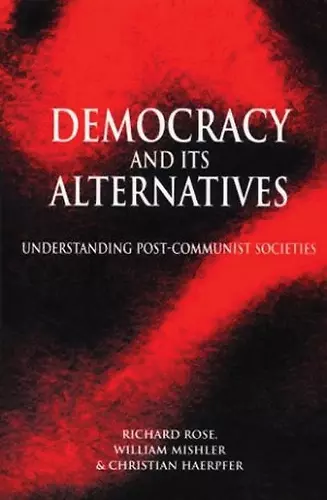Democracy and its Alternatives
Understanding Post-Communist Societies
Richard Rose author William Mishler author Christian Haerpfer author
Format:Paperback
Publisher:John Wiley and Sons Ltd
Published:1st Oct '98
Currently unavailable, and unfortunately no date known when it will be back
This paperback is available in another edition too:
- Hardback£60.00(9780745619262)

The collapse of communism has created the opportunity for democracy to spread from Prague to the Baltic and the Black seas. But the alternatives - dictatorship or totalitarian rule - are more in keeping with the traditions of Central and Eastern Europe.
Will people put up with new democracies which are associated with inflation, unemployment, crime and corruption? Or will they return to some form of authoritarian regime? Half a century ago, Winston Churchill predicted that people will accept democracy with all its faults - because it is better than anything else that has ever been tried. To find out if Churchill was right, this book analyses a unique source of evidence about public opinion, the New Democracies Barometer, covering the Czech Republic, Hungary, Slovakia, Poland, Slovenia, Bulgaria, Romania, Belarus and Ukraine.
The authors find that there is widespread popular support for democracy compared to communism, dictatorship and military rule. People who have been denied democratic freedoms value new political rights more highly. Economic concerns are second in importance. If democracy fails, it will be because political elites have abused their power, not because the public does not want democracy.
Looking at post-communist Europe makes us think again about democracy in countries where it is taken for granted. The abrupt transition to democracy in post-communist countries is normal; gradual evolution in the Anglo-American style is the exception to the rule. Complaints in Western countries about democracy being less than ideal reflect confidence that there is no alternative. Post-communist citizens do not have this luxury: they must make the most of what they have.
This important book makes an important contribution to current debates about democratization and democratic theory and to the growing literature on the social and political changes taking place in post-communist societies. It will be of particular interest to students and scholars in politics and sociology.
"No challenge is more important to the democratic stability after the transition than building public support for democracy, and no recent study better illuminates the determinants of that support than this engaging, pathbreaking and methodologically innovative book. This is not just a book for specialists in public opinion or post-communist states: it should be read by anyone concerned with the fate of the new democracies of the "third wave"." Larry Diamond, Senior Research Fellow, Hoover Institution, Stanford University
"After the fall of the Berlin Wall, we need to understand what is happening in the post-communist world. This book joins theory and a unique wealth of survey data from countries of Central and Eastern Europe and the former Soviet Union. There is no more timely book on democracy." Juan J. Linz, Sterling Professor of Politics and Social Science, Yale University
"What makes people living under post-communism "buy" liberal democracy and reject its authoritarian alternatives? Starting with an original reading of Schumpeter and Churchill, Rose and his co-authors offer a number of fresh answers based on comparative survey analysis. The overall optimistic answer is that Central East European democracy is well on its way to completion and that this holds true even in the absence of economic miracles. A must for students of post-communist societies." Claus Offe, Professor of Political Science at Humboldt University, Berlin
ISBN: 9780745619279
Dimensions: 229mm x 155mm x 23mm
Weight: 422g
288 pages